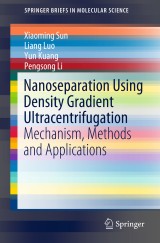Details

Nanoseparation Using Density Gradient Ultracentrifugation
Mechanism, Methods and ApplicationsSpringerBriefs in Molecular Science
|
58,84 € |
|
| Verlag: | Springer |
| Format: | |
| Veröffentl.: | 15.07.2018 |
| ISBN/EAN: | 9789811051906 |
| Sprache: | englisch |
Dieses eBook enthält ein Wasserzeichen.
Beschreibungen
This brief introduces the classification and mechanism of density gradient ultracentrifugation (DGUC) method with rich examples showing the versatility of such an efficient separation technique. It also gives a strict mathematical description and a computational optimization model to predict the best separation parameters for a given colloidal system. The concept of “Lab in a tube” is proposed in the last chapter, which allows the size-property relationship investigation, synthetic optimization and reaction/assembly mechanism exploration etc.
Introduction to nanoseparation.- Basic concepts of density gradient ultracentrifugation.- Classification of density gradient ultracentrifugation.- Density gradient ultracentrifugation technique.- Density gradient ultracentrifugation of colloidal nanostructures.- Mechanism and mathematical optimization of density gradient ultracentrifugation.- Lab in a tube.- Concluding Remarks and Perspective.<p></p><p></p><p></p>
Professor Xiaoming Sun obtained his BS and PhD from Department of Chemistry, Tsinghua University in 2000 and 2005, respectively. After the post-doctoral work at Stanford University, he joined the faculty of Beijing University of Chemical Technology in 2008. His research interests focus on controlled synthesis, separation, assembly, and property investigation of functional inorganic nanomaterials. He has published more than 60 research papers as the first author or corresponding author in prestigious journals including <i>J. Am. Chem. Soc., Angew. Chem. Int. Ed., Adv. Mater., Chem. Sci. etc.</i> These articles have been cited more than 5000 times in total. He also holds 8 national patents and 1 international patent. He was awarded the 100 Excellent Doctoral Dissertations in China (2007) and the New Century Excellent Talents in Chinese Universities (2008). In 2011 he was supported by National Science Foundation for Distinguished Young Scholars. In 2014 he was on the list of Most Cited Chinese Researchers in Material Science (Elsevier).
This book introduces the classification and mechanism of density gradient ultracentrifugation (DGUC) method with rich examples showing the versatility of such an efficient separation technique. It also gives a strict mathematical description and a computational optimization model to predict the best separation parameters for a given colloidal system. The concept of “Lab in a tube” is proposed in the last chapter, which allows the size-property relationship investigation, synthetic optimization and reaction/assembly mechanism exploration etc.
Discusses in detail the mechanism and methods of density gradient ultracentrifugation Provides rich examples using different DGUC systems to show the versatility of this technique in nanoseparation Introduces the computational model for the optimization of the separation parameters Proposes a “Lab in a tube” concept for size-property relationship investigation, synthetic optimization and reaction/assembly mechanism exploration etc
<p>Discusses in detail the mechanism and methods of density gradient ultracentrifugation </p> <p>Provides rich examples using different DGUC systems to show the versatility of this technique in nanoseparation </p> <p>Introduces the computational model for the optimization of the separation parameters</p> <p>Proposes a “Lab in a tube” concept for size-property relationship investigation, synthetic optimization and reaction/assembly mechanism exploration etc</p>
Diese Produkte könnten Sie auch interessieren:

Verbesserung des Wissensmanagements in der manuellen Montage durch Einsatz eines Anreizsystems

von: Robin Dennis Sochor

59,99 €
















